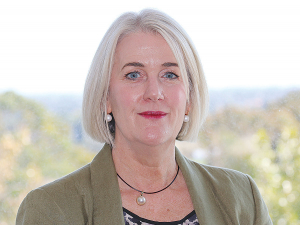So says rural health professional Professor Jane Mills, pro vice-chancellor of the College of Health at Massey University. She was raised on a farm in Australia and has extensively researched rural health issues.
She told Rural News that the staff shortage in rural areas is forcing many people to work extra hours beyond what is reasonable and that their work/life balance is out of sync, resulting in physical or mental health issues.
“We continue short of nurses, doctors and midwives -- a big issue the government in particular is very conscious of,” Mills says.
“And there’s a broader aspect: the impact of a shortage of a general workforce and the impact that’s having on people’s health and wellbeing.”
Mills says government awareness must be raised about the knock-on effects of their decisions on migration and the casual workforce. For example, challenges arise in rural regions when casual workers arrive in towns to harvest particular crops or to work during seasonal peaks on livestock properties.
“It can mean that a small rural health service may have to serve a doubled population at particular times of the year. That can be hard because they often don’t have enough capital infrastructure – let alone personnel – to manage the extra flow of people coming in and through their communities.”
Growing tourist numbers add to the problem and this needs considering in an appropriate health service mix or ‘basket’ of services for a particular area.
Mental health
Mental health issues are much talked about in rural regions, Mills says.
But people can get exhausted talking about it, with a risk that they will ‘tune out’.
“That story is alive and well, particularly among vulnerable groups such as young men.
“Young men in rural areas are much more susceptible to mental health issue than other groups. We need to be focused on that and ensuring their access to good services out there to try to prevent an escalation of mental health conditions in rural areas.”
A key way to approach mental health and other health issues is by having universities and industry collaborating — a linkage that should not be underestimated.
A stint in the country
Mills says research shows the best way to get health professionals into rural regions is to assign student nurses and doctors to clinical placements there for an appropriate time as part of their training.
Such immersion in a rural community could open their eyes to the possibilities of a career in rural health. To this end, Mills says, there is talk of setting up a national school of rural health which would place students in rural communities, with accommodation provided and mentoring by experienced rural health professionals.
While people working in rural locations require the common medical skills, some extra ones are also required.
“A lot of research, including my own, shows the impact of working in a rural town: I call it ‘live my work’. People who work and live in rural areas can never get away from their work.
“For example, people in the supermarket will ask them questions, and the same may happen on the sideline of a football match when they are watching their children play on a Saturday.
“So there is a lot of extra strain and stress which requires rural health professionals to be very resilient and to have a good insight into how they can manage a better work/life balance.”









